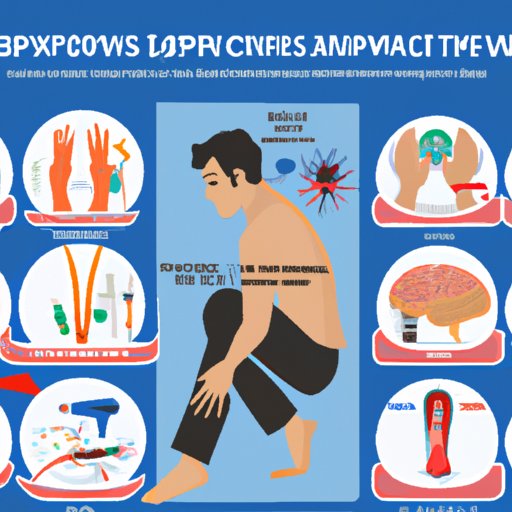
Introduction
Neuropathy is a condition that affects the peripheral nervous system, which encompasses the nerves outside the brain and spinal cord. This condition can present itself in several ways, including numbness, tingling, and pain. It can affect various parts of the body, including the feet, legs, hands, and arms. Understanding neuropathy symptoms is essential, as they can significantly affect your daily life and overall health.
The Ultimate Guide to Understanding Neuropathy Symptoms: What They Are and How to Spot Them
What is Neuropathy?
Neuropathy refers to the damage or dysfunction of one or multiple peripheral nerves that result in a range of symptoms. This can impact the nerves that control movement, sensation, organ function, and basic body functions, including blood pressure and heart rate. The causes of neuropathy can vary, including autoimmune diseases, infections, metabolic disorders, traumatic injuries, and certain medications, among others.
What Causes Neuropathy Symptoms?
Neuropathy symptoms can be caused by several underlying conditions, including:
- Diabetes
- Autoimmune diseases
- Drug and alcohol abuse
- Trauma or injury, such as a broken bone
- Exposure to toxins, such as chemotherapy drugs
- Chronic infections, such as HIV or hepatitis C
- Genetic disorders, such as Charcot-Marie-Tooth disease
Signs and Symptoms of Neuropathy
Neuropathy symptoms can vary depending on the type of nerve affected and the underlying cause. The following are common neuropathy symptoms:
- Pain or discomfort
- Numbness or tingling sensations
- Muscle weakness or twitching
- Loss of coordination or balance issues
- Burning sensations or hypersensitivity to touch
- Changes in skin, hair, or nail growth
- Difficulty with digestion or bowel movements
- Sexual dysfunction
- Bladder control problems or incontinence
The Importance of Early Detection
Early detection is key when it comes to neuropathy symptoms. If left untreated, neuropathy can cause permanent nerve damage, making early intervention critical. Therefore, it’s essential to recognize the early signs of neuropathy and seek medical attention immediately.
10 Neuropathy Symptoms You Need to Know About
1. Pain
Pain is one of the most common symptoms associated with neuropathy. The type of pain can vary from patient to patient, ranging from constant to intermittent. The pain may also be sharp or dull, making it difficult to pinpoint the exact location where the pain is originating.
2. Numbness or Tingling Sensations
Another common symptom of neuropathy is the sensation of numbness or tingling. These sensations can occur in localized areas or throughout the body and can significantly impact an individual’s ability to perform daily activities.
3. Muscle Weakness
Neuropathy can also cause muscle weakness that may make it challenging to hold objects or walk. The rate of muscle weakness can vary from patient to patient, with some experiencing a gradual decline while others experience a rapid reduction.
4. Loss of Coordination
Along with muscle weakness, neuropathy can also result in a loss of coordination. This can make it challenging to perform routine tasks such as writing, typing, or even walking.
5. Burning Sensations
Individuals with neuropathy may experience a burning sensation in the affected areas. The sensation can range from mild to severe and can be accompanied by other symptoms such as itching or hyperalgesia.
6. Sensitivity to Touch
Neuropathy can make individuals hypersensitive to touch. This can cause patients to feel pain when clothing rubs against the skin or light touch is applied.
7. Changes in Skin, Hair, or Nail Growth
Neuropathy can cause changes in skin, hair, or nail growth, making it essential to keep an eye on any changes in these areas. For example, hair may change texture, or nails may become brittle and easily breakable.
8. Digestive System Issues
Neuropathy can impact the digestive system. Patients may experience constipation, nausea, or diarrhea that does not improve with over-the-counter remedies.
9. Sexual Dysfunction
Neuropathy can also significantly impact sexual function. Individuals may experience a lack of libido, or pain during sexual intercourse.
10. Bladder Control Problems
Finally, neuropathy can also lead to urinary incontinence or difficulty controlling the bladder. Patients may experience frequent urinary tract infections or feel like they need to urinate but are unable to.
Living with Neuropathy: Recognizing the Signs and Symptoms
Importance of Self-Care
Individuals with neuropathy can significantly benefit from daily self-care practices. For example, keeping the affected areas clean and dry can prevent infections from occurring. It’s also critical to manage any underlying conditions, such as diabetes, to prevent further nerve damage. Finally, it’s essential to be mindful of any medication side effects that may exacerbate neuropathy symptoms.
Coping Strategies
Neuropathy symptoms can be challenging to manage, so it’s essential to have coping strategies in place to manage the pain and discomfort associated with the condition. For example, maintaining an active lifestyle can help manage neuropathy symptoms by improving circulation and reducing inflammation.
Psychological and Emotional Support
Mental health is equally important when it comes to neuropathy symptoms. Living with chronic pain can take a significant toll on an individual’s mental health, leading to depression or anxiety. Seeking support from a therapist or a support group can help individuals manage the psychological side effects of neuropathy.
Lifestyle Changes
Finally, there are several lifestyle changes individuals with neuropathy can make to improve their quality of life. For example, maintaining a healthy diet rich in vitamins and nutrients can help improve overall health, while avoiding nicotine and alcohol can reduce inflammation and improve nerve function.
The Connection Between Neuropathy Symptoms and Nerve Damage
Anatomy of the Nervous System
The peripheral nervous system, which includes the nerves outside the brain and spinal cord, controls the body’s functions. The nerves consist of bundles of fibers that transmit impulses between the brain or spinal cord and other parts of the body.
Causes of Nerve Damage
As mentioned earlier, several underlying conditions can cause neuropathy, and nerve damage is often the culprit. Autoimmune disorders, infections, metabolic diseases, and toxin exposure can all cause nerve damage, resulting in neuropathy symptoms.
Impact of Nerve Damage on Neuropathy Symptoms
When nerve damage occurs, the nerves may no longer function correctly, leading to neuropathy symptoms. Over time, the nerve damage can become permanent, making early detection and intervention critical in preventing further damage.

From Tingling to Numbness: Unpacking Neuropathy Symptoms
Exploring the Sensations
Neuropathy symptoms can present themselves in a wide variety of sensations. Individuals may experience feelings of tingling, pain, or burning, among others. Understanding the sensations can help individuals manage their symptoms more effectively.
Understanding the Progression of Symptoms
Neuropathy symptoms often progress over time, making it essential to monitor symptoms and seek medical attention if they worsen. Early detection can prevent further damage, while late detection can lead to permanent nerve damage.
How to Identify Symptom Triggers
Keeping track of symptom triggers can help individuals better manage neuropathy symptoms. Triggers can include certain foods, medications, or activities. By identifying and avoiding triggers, individuals can reduce the frequency and severity of symptoms.
When You Should See a Doctor for Neuropathy Symptoms
Red Flags
If you’re experiencing any neuropathy symptoms, it’s essential to keep an eye out for any red flags that may indicate the need for medical attention. These include:
- Progressive muscle weakness
- Loss of bladder or bowel control
- Sudden or severe pain
- Significant changes in skin, hair, or nail growth
- Fever or other signs of infection
Early Detection
The earlier neuropathy symptoms are detected, the better the chances are for successful treatment. It’s essential to seek medical attention if you’re experiencing any of the signs and symptoms of neuropathy.
Diagnostic Tools and Tests
Physicians can diagnose neuropathy through a variety of tests, including nerve conduction studies and electromyography. These tests can help determine the extent of the nerve damage and guide treatment options.
How to Manage Neuropathy Symptoms and Improve Your Quality of Life
Pain Management Strategies
Pain can be a debilitating symptom of neuropathy, so it’s essential to have pain management strategies in place. These may include medications, such as over-the-counter pain relievers, physical therapy, or alternative therapies, such as acupuncture or massage.
Medications
Several medications can help manage neuropathy symptoms, including anti-seizure medication, antidepressants, and topical creams, among others. Your doctor can help determine which medications are best suited to manage your specific symptoms.
Physical Therapy
Physical therapy can help strengthen muscles, improve balance and coordination, and reduce pain associated with neuropathy. It’s essential to work with a licensed physical therapist who specializes in neuropathy treatment to ensure the best results.
Alternative Therapies
Alternative therapies, such as acupuncture, massage, and chiropractic care, have been shown to help manage neuropathy symptoms in some patients. It’s essential to discuss these options with your doctor before pursuing any alternative therapies.
Dietary Changes
Modifying your diet can help improve overall health and reduce inflammation in the body. For example, incorporating anti-inflammatory foods, such as leafy greens and fatty fish, can help reduce neuropathy symptoms.
Lifestyle Recommendations
Finally, there are several lifestyle recommendations individuals can consider to manage neuropathy symptoms, such as daily exercise, maintaining a healthy weight, and avoiding alcohol and nicotine.
Conclusion
Neuropathy symptoms are a common and often debilitating condition that can significantly impact a person’s quality of life. Recognizing the signs and symptoms is essential for early detection and intervention, preventing further nerve damage. By adopting healthy lifestyle habits and seeking medical attention when necessary, individuals can manage their symptoms and improve their overall well-being.




